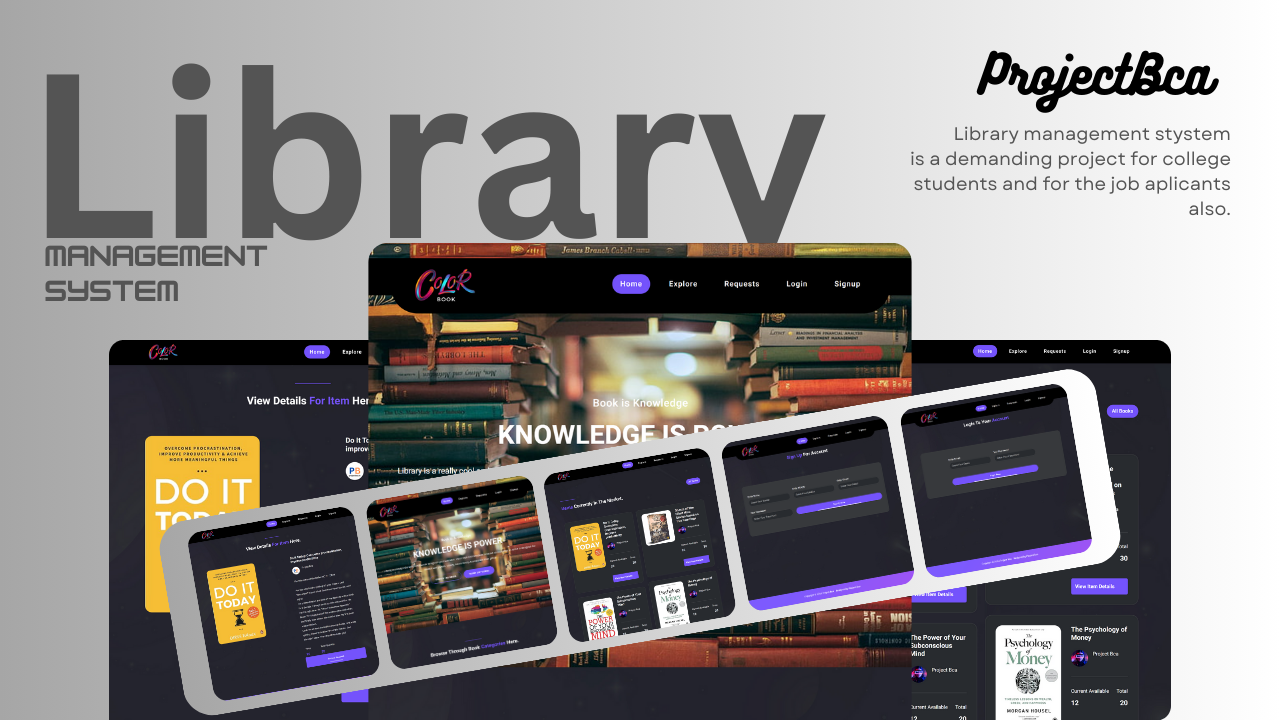News
Library Management System In Laravel/PHP with Source Code

Library Management System with Source Code: An Overview
Introduction
In the digital age, managing a library efficiently requires more than just traditional methods. A Library Management System (LMS) with source code can be a game-changer, offering robust backend functionalities and a user-friendly frontend. Our LMS, developed using Laravel, HTML, CSS, Bootstrap, JavaScript, and jQuery, exemplifies this with its comprehensive features and ease of use. This article provides an in-depth overview of the LMS, its source code, and how it enhances library operations.
Overview of the Library Management System
A Library Management System is a software designed to manage all aspects of a library’s operations, from cataloging and inventory management to user administration and borrowing services. The source code of our LMS is meticulously crafted to ensure flexibility, scalability, and ease of customization.
Source Code Structure
The LMS source code is organized into several key components, each responsible for different functionalities. Here's a brief overview:
Backend (Laravel): Handles server-side logic, database interactions, authentication, and API endpoints.
Frontend (HTML, CSS, Bootstrap, JavaScript, jQuery): Manages the user interface and client-side interactivity.
Database: Stores all data related to books, categories, users, and transactions.
Backend Features
The backend is the powerhouse of our LMS, equipped with features to streamline and optimize library management.
Dashboard
The dashboard provides a comprehensive overview of the library's status. It displays critical information such as the total number of books, categories, borrow requests, and user activities. This central hub allows administrators to quickly assess the library's current state and make informed decisions.
Categories Management
Efficient management of book categories is crucial for any library. Our LMS includes:
Category List: Displays all existing categories with options to view, edit, delete, or toggle active/inactive status.
Category Add: Allows administrators to add new categories easily through a simple form.
Author List
The Author List feature enables administrators to manage author information effectively. It includes options to view, edit, delete, or change the active/inactive status of authors, ensuring that the author database is accurate and up-to-date.
Books Management
Books are the heart of the library, and our LMS includes comprehensive book management features:
Book List: Displays all books with details such as title, author, category, and availability status. Administrators can edit, delete, or toggle the active/inactive status of books.
Book Add: Simplifies the process of adding new books to the library's collection.
Borrow Request
The Borrow Request feature streamlines book lending. Users can submit requests to borrow books, which administrators can view, approve, or deny. This feature ensures an organized and efficient lending process.
Users Management
Managing users is essential for any LMS. This feature allows administrators to oversee registered users, including their roles and permissions. Administrators can add new users, edit user information, or delete users as necessary, ensuring a well-managed and secure user base.
Frontend Features
The frontend of our LMS is designed to be intuitive and responsive, making it accessible and easy to use for all users.
User Interface
The UI is clean and modern, providing a seamless experience for users. Navigation is straightforward, allowing users to easily access different sections of the LMS, such as book search, borrow requests, and profile management.
Book Search
Finding books is effortless with the search functionality. Users can search for books by title, author, or category, and the results are displayed in an organized manner, providing all necessary information at a glance.
Responsive Design
The LMS is fully responsive, ensuring that it works flawlessly on all devices, including desktops, tablets, and smartphones. This adaptability enhances the user experience by making the system accessible on any device.
Login and Signup Functionality
Secure and personalized access is a priority, and our LMS includes robust login and signup functionalities:
Login: Users can log in using their credentials to access their personalized dashboard, view borrow history, and manage their profile.
Signup: New users can easily create an account by providing basic information, gaining access to the library's resources quickly and efficiently.
Technologies Used
Our LMS leverages a range of technologies, each chosen for its strengths and capabilities:
Laravel: A powerful PHP framework for building robust and scalable web applications.
HTML and CSS: Fundamental web technologies for structuring and styling the frontend.
Bootstrap: A popular CSS framework for enhancing design and responsiveness.
JavaScript and jQuery: Technologies for adding interactivity and simplifying DOM manipulation and event handling.
How to Run the Laravel Project
Running a Laravel project involves a few essential steps. Here’s a step-by-step guide to get your LMS up and running:
Download the source code First, download the project repository to your local machine using Git.
https://projectbca.in/project/38/library-mangement-system-project-in-laravel
Navigate to the Project Directory Change to the project directory.
cd LBS
Run the first command to clear the cache.
php artisan optimize
Run the Development Server Start the Laravel development server.
php artisan serve
Access the Application Open your web browser and navigate to http://localhost:8000 to access the application.
Conclusion
Our Library Management System, complete with source code, is a comprehensive solution for streamlining library operations. By leveraging modern technologies and incorporating essential features, it provides an efficient and effective tool for managing libraries of all sizes. Whether you are an administrator overseeing library operations or a user searching for books, this LMS ensures a seamless and enjoyable experience.
With its robust backend, intuitive frontend, and comprehensive feature set, our Library Management System stands as a powerful tool for modern libraries, paving the way for efficient and effective library management. Follow the steps above to get your LMS up and running, and start experiencing the benefits of a well-organized and user-friendly library management system.

.png)
.png)